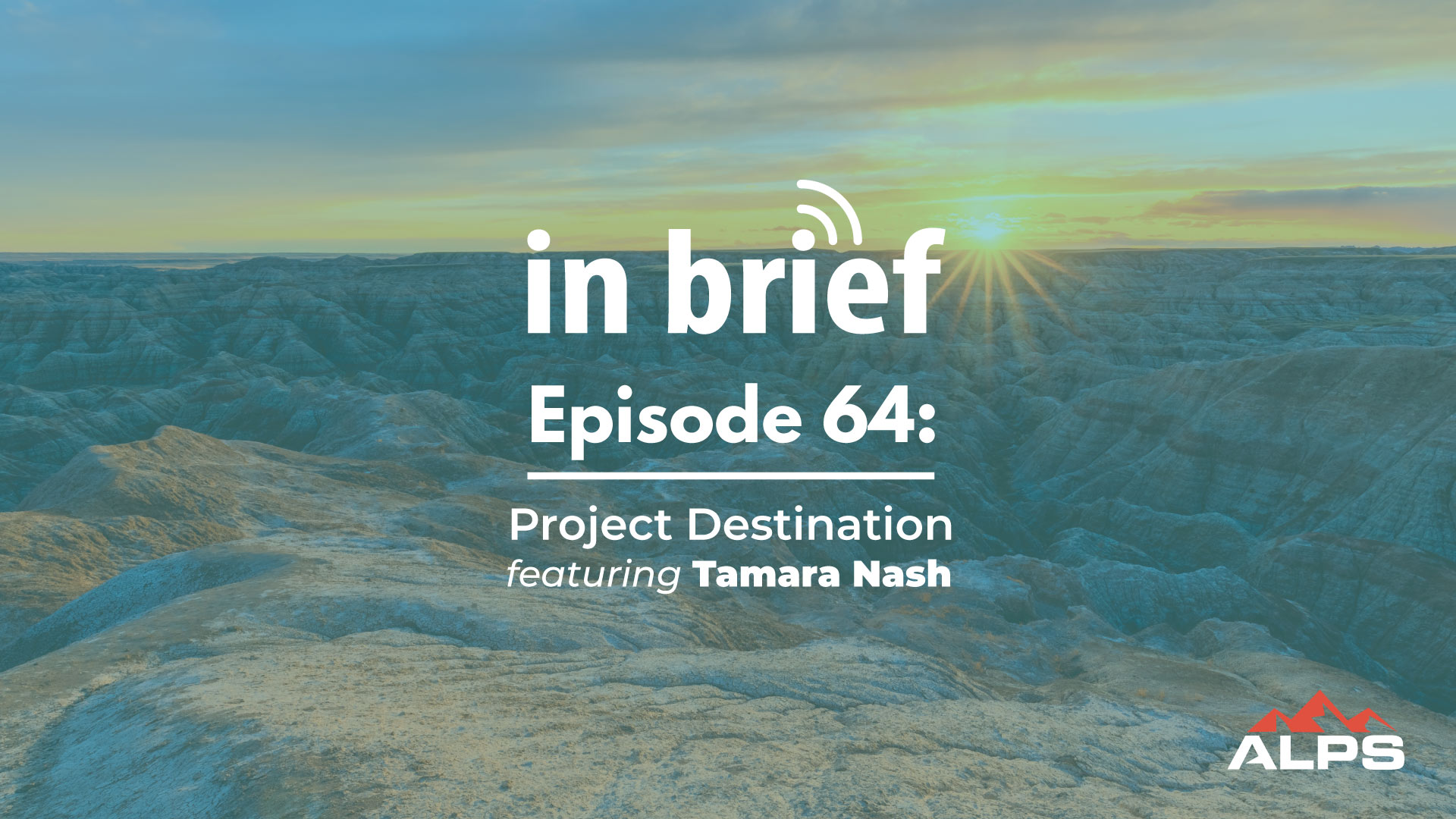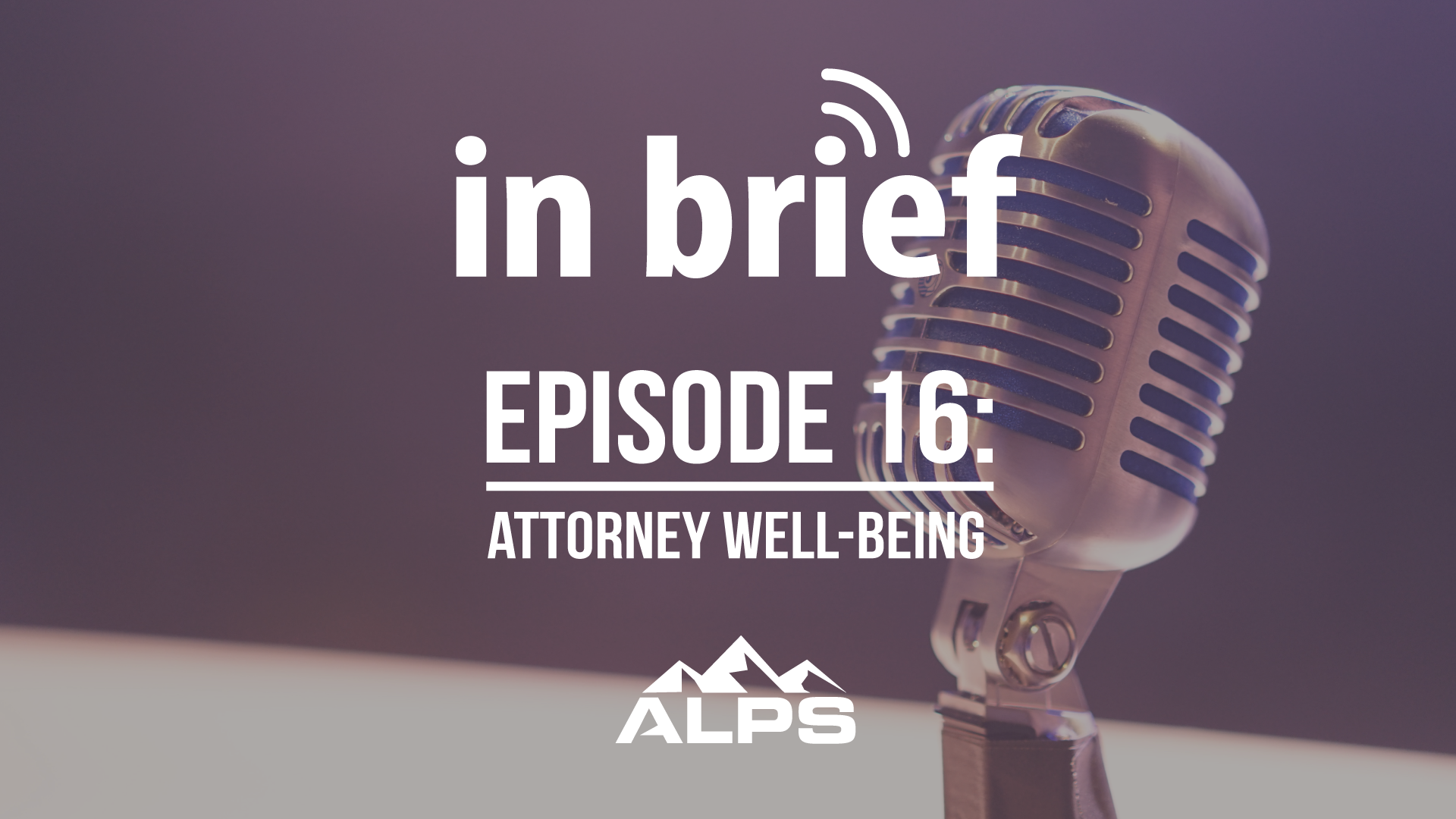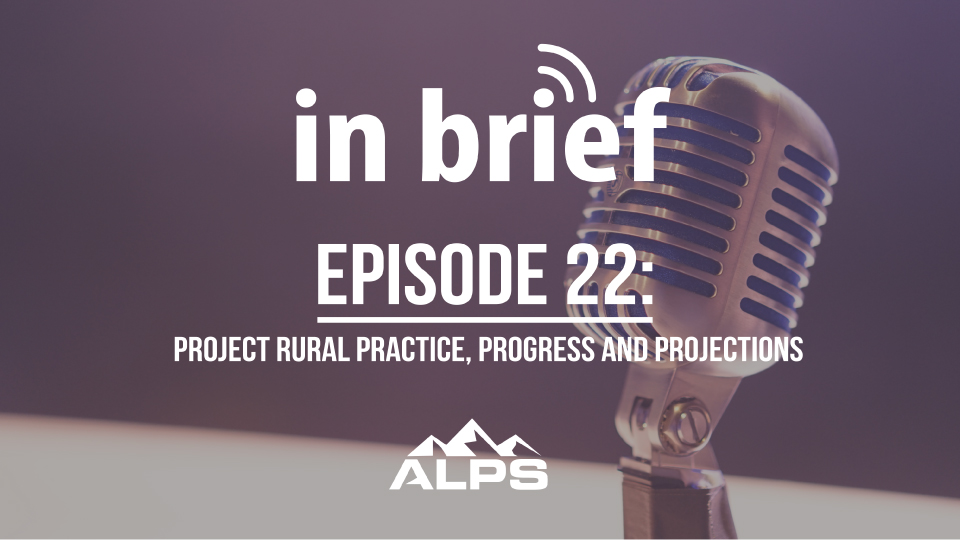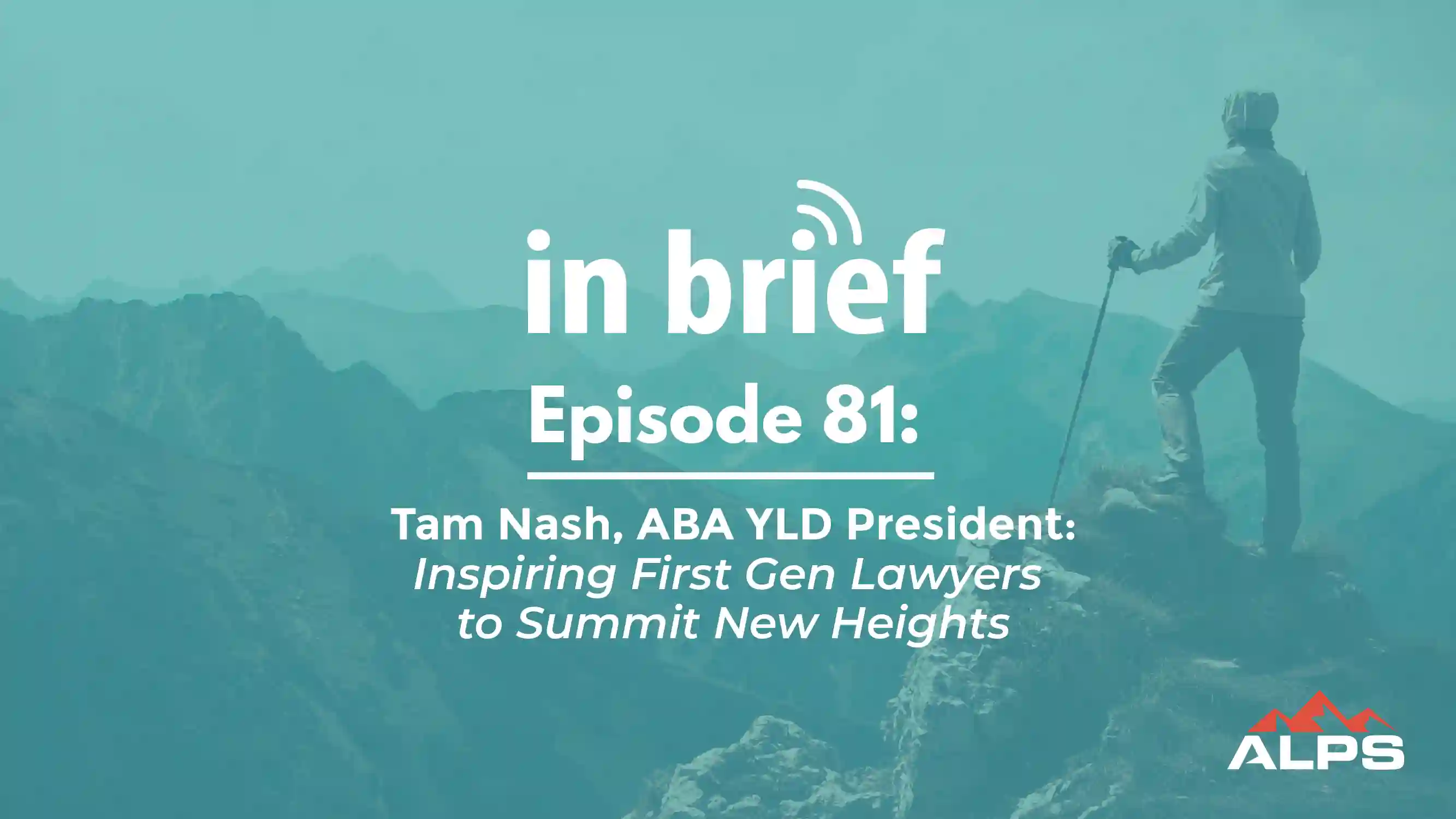ALPS In Brief – Episode 64: Project Destination
11 min read
 Mark Bassingthwaighte, Risk Manager
:
Updated on March 1, 2024 | Posted on August 4, 2022
Mark Bassingthwaighte, Risk Manager
:
Updated on March 1, 2024 | Posted on August 4, 2022

Transcript:
Mark Bassingthwaighte:
Hello, I’m Mark Bassingthwaighte quick, the risk manager here at ALPS, and welcome to the latest episode of ALPS In Brief, the podcast that comes to you from the historic Florence building in beautiful downtown Missoula, Montana. I’m on the road today and out in South Dakota at a convention and have had the pleasure to meet Tamara Nash. And she is the Director of Experiential Learning and a lecturer at the University of South Dakota School of Law. And first, I just want to say welcome.
Tamara Nash:
Thank you.
Mark Bassingthwaighte:
It’s a pleasure. Before we get into the topic that we’re going to be discussing today. I would love to… Just to have you share a few things about yourself. Introduce yourself. What does the audience need to know and enjoy hearing about?
Tamara Nash:
Sure. Yeah. So I am a recent transfer to the law school, but I would say probably, more importantly, I’m a proud aunt, first-generation law student, and first-generation college student. I am a serial joiner. So bar junkie.
Mark Bassingthwaighte:
I love it.
Tamara Nash:
Yes. I just… In the midst of joining clubs and organizations, I’m usually there. So really involved in the South Dakota State Bar, American Bar Association, and the Young Lawyers Division. I love to bake. I try to rival Betty Crocker cupcakes.
Mark Bassingthwaighte:
Oh, with kindred spirits there on some things. I can see that.
Tamara Nash:
Yes. It’s my de-stressor. But yeah, just… I like to be with friends and family and fellowship and try to find time to watch a good show on Netflix here or there.
Mark Bassingthwaighte:
Oh yeah. Yeah. I get that too. Well, let me ask, what initially brought you into law? Where’s the interest? How did that arise?
Tamara Nash:
So really interesting. I actually had a sixth-grade project that planted the whole seed and it’s actually all tied into Project Destination. And I think we’ll kind of have an interwoven conversation that ties into this question. So in sixth-grade, I had a teacher and we did a mini society project and we had our own country name. We made our own money. And at the end of the year, we had our own stations where we did our own thing. Some of us sold stationary. One of our classmates sold hot dogs, which is really questionable when you trust sixth graders to cook and sell you hot dogs. But we were doing our thing and one of the classmates who was selling hot dogs, his classmate fired him because he wasn’t pulling his end of the weight and he was very upset about that.
Tamara Nash:
So my teacher said, “Hey, you can do something about that.” So our class had a wrongful termination lawsuit and-
Mark Bassingthwaighte:
Oh my gosh.
Tamara Nash:
… Some of us were jurors. We had a judge and I was his lawyer. And it was really fun. We had a really good time and we won. I don’t know if fair practices happened. I don’t know if we played by the rules, but my teacher, Mr. Summit, the best teacher I’ve ever had said, “I think you really enjoyed that.” And he brought in three black women attorneys to come talk to me. We sat in the cafeteria and they told me what it was like to be a lawyer and what it meant, and just always stuck with me. Of course, I still had to go to high school. I still had to go to college. But then it became time to figure out what’s next? And I took the LSAT and enrolled at the University of South Dakota.
Mark Bassingthwaighte:
That is such a cool story. And what a creative teacher. You know just… We all have certain favorite… My favorite teacher was Miss Fleschmann from third grade. But we have these memories and it’s fascinating in terms of the impact that they have long-term in your life.
Tamara Nash:
Absolutely.
Mark Bassingthwaighte:
These seemingly small kinds of interesting things, but boy did they have big ramifications? We had brought up Project Destination, and that’s really what I am interested in learning about myself and sharing with our listeners. So what is Project Destination? Maybe that’s where we start.
Tamara Nash:
Absolutely, would love to tell you. So at its core, it’s a pathway or pipeline program that goes into schools. We target students, anywhere from elementary school to high school. We have gone into post-secondary and really just plant the seed that, “Hey, have you considered the legal profession?” We’re open to talking to any student, but we specifically target Native American students. In the South Dakota Bar, we have about 2,700 lawyers, but we have anecdotally, maybe 10 to 15 Native American attorneys. Our bar doesn’t collect demographic details on ethnicity or race. So I say anecdotally because that’s looking around the bar and kind of counting what we have. So that is our most underrepresented group of attorneys. So we want to find a way to reach that population. And it’s quite profound to go into a school and speak to a group of individuals who don’t see people who look like them and say, “Hey, have you thought about this? You can do this.”
Mark Bassingthwaighte:
Right. Yeah.
Tamara Nash:
And especially put forth an example that looks like them. And that was the experience I had in sixth grade. To see an example of myself, of someone who says, “Hey, I look like you. And this is what I do. And you can do it too.” So Project Destination essentially goes into the school, does a moderated panel, and just chats with students about what it means to be a lawyer. The panelists who are all young lawyers, hopefully as diverse as we can make it. So a corporate attorney, a prosecutor, a defense attorney, a general practice attorney, and explain what they do every day. Talk about law school, talk about the bar, and just let students know that this is an attainable goal. And the goal is essentially holding up a mirror to a student and letting them know that this idea is attainable, so.
Mark Bassingthwaighte:
What I love about this too, just in terms of… And sharing with all of you. Listening to this, the smile, the authenticity of your story, investment, it just… I find it God bless kind of thing, but it seems to me you’re paying it forward. You know you’re continuing what this teacher did in very creative and meaningful ways. That’s awesome. How old is this program?
Tamara Nash:
Yeah, so we’re still new-ish. We were able to start the program in 2017. And then of course, COVID happened.
Mark Bassingthwaighte:
Oh, wow. Yes.
Tamara Nash:
We’re all familiar with that caveat, right?
Mark Bassingthwaighte:
Right.
Tamara Nash:
So we came out the gate running the year that we launched it. Our then Young Lawyer Section President, now Judge Abby Howard, launched with a strong start. We reached about 150 students. We had about 25 young lawyer volunteers. And then we pivoted to a virtual setting. So we are thrilled to get back into the schools in person this bar year.
Mark Bassingthwaighte:
Yeah. And would you say you’re finding a lot of success with it and how are you measuring that right now? Because I assume nobody has gone off to law school quite yet. We haven’t been there quite long enough, but.
Tamara Nash:
Yes. Yes. So I would say, yes. We have had success. And I would say we measure that in a couple of ways. So success in just a purely objective way, we’ve been recognized by the ABA Young Lawyers Division and the ABA broadly with two awards. In 2017, we received a grant from the Young Lawyers Division, it’s the embracing diversity grant. And that seeks to recognize any pipeline pathway program that digs in and does the work. And so we submitted Project Destination in its first year and we won second place and received a thousand dollars to keep doing the work. So we continued. And then in 2020, the ABA recognized us with the partnership award, which essentially looks at any bar program doing DENI work, that says, “Hey, tell us what programs you’re doing. How can we put forth a model so that other bars can replicate it?”
Tamara Nash:
And we were recognized with that award at the 2020 ABA Meeting. But I would say more importantly success in the context of the profession and pathway and pipeline programs is not necessarily measured by numbers. This work is measured by the ripple effect. Reaching one student is success. And if you go to a school and there’s one student in the room that you reach, that is point blank, success. The effect that you have by touching one student’s life impacts generations.
Mark Bassingthwaighte:
Oh, I agree.
Tamara Nash:
So you have… My teacher reached me and I came to law school and that pays dividends for me, my hopeful children to come in the future, and their children. And so that is success that’s profound. So our goal is not to hit an X number of students per year. Our goal is to reach one child and to change their perspective of what they are capable of.
Mark Bassingthwaighte:
It’s the butterfly effect.
Tamara Nash:
Yes. Absolutely.
Mark Bassingthwaighte:
Yeah. Yeah. Is part of this too, to try to… I mean, South Dakota is not unique in terms of rural states and some of the problems we face. There are lots of unmet needs and I would anticipate… I’ll be honest and say, I don’t have firsthand knowledge. But I would anticipate there are probably a fairly significant portion of people on the reservations that do not have access in terms to legal services. Is part of the intention or desire of the program to meet that need as well?
Tamara Nash:
Yes.
Mark Bassingthwaighte:
Okay.
Tamara Nash:
Yeah. So I think part of the need… It’s multifaceted. It’s to change the perspective of the community to not just a negative perception, to create that exposure, to shift a dynamic and perception of a student’s own capability, but also to meet those legal services needs. And there’s that multidimensional need in the rural nature that a lot of our reservations have, but also in the demographic need that we do not have lawyers who look like the communities we’re serving. And that is very problematic because it continues to… I think creates a lack of trust in our system and we should represent the people we’re charged to serve. And so I think that is that dual issue that we’re hoping to address and I think more broadly we have rural deserts that we want to serve. So Project Destination serves our broader community in rural schools where we have students who may not have an attorney for miles upon miles. So it’s a win-win in all facets, but also gets students through the door who are underserved.
Mark Bassingthwaighte:
So how do you see… We’ve come out of COVID and we’re kind of finding our feet again and that’s awesome. Where do you see the program? What does it look like in five years?
Tamara Nash:
Yeah. So-
Mark Bassingthwaighte:
Where are we moving toward?
Tamara Nash:
Yeah. I hope that we move towards a more cohesive approach with our broader bar. And I’m really excited for our leadership. We have just immense support by our bar presidents, our bar commission, and our executive director. But to really be all on one page and all moving forward. So it’s the full force of the South Dakota Bar and throwing all our efforts and all of our energy,. You kind of can’t be a bar of jar marbles throwing on the ground, scattered in different directions. But I think playing the long game to decide what age groups we target and why that matters.
Tamara Nash:
A lot of the research shows that early intervention for pathway is actually more effective. And I think folding in broader strategies for pathway. Financial education, which folds into student debt research, which we know is the number one problem.
Mark Bassingthwaighte:
That’s a huge issue.
Tamara Nash:
Yes. I know that very intimately as a young lawyer. But folding in those strategies discussing access barriers to the profession and to law school. So I think just really having honest dialogues around the profession, around pathways, not just encouraging students to come, but really looking at why some folks have not been able to get into the profession and why they leave. Because retention and attrition are also issues.
Mark Bassingthwaighte:
Well, that’s an excellent point. Yeah. I do a lot of education just on attorney wellness. And boy has COVID made those issues even far more significant and then you factor in these debt issues and all. So many things to-
Tamara Nash:
The onion.
Mark Bassingthwaighte:
Yeah, exactly. Right. Exactly, right. You know I kind of want to ask an open-ended question. What about Project Destination and all of this… What do you really want to share? Just go wherever you want to go with it.
Tamara Nash:
Sure. So I think what I would love to share is that I think some folks don’t know where their place is in this conversation. And it’s all of our battles. We all have a place and a stake in this conversation and in the effort of pathway efforts. I think we would see our efforts move so much more quickly. The needle would move forward much more seamlessly if we all bought into that idea and into that notion. So I would just really like folks to know that. We’re all part of this conversation. We all have ownership. And it’s just a matter of understanding where we are in the conversation when we amplify the voices of others. When we step in as an ally it matters to our profession just immensely and we all owe it to our profession to pay it forward and be a part of enriching our profession and servicing our community.
Mark Bassingthwaighte:
Hmm. Yeah. I get where you’re going with that. You know I talk about some similar issues at times. Again, in what I do in risk management and ethics and things, you hear a lot of lawyers complain about problems that bars face. And they never want to do anything about it. You know? If you want to complain, okay. I think it’s… You should have the freedom and the ability to complain a little bit, but not if you’re not willing to step up and try to do something about solving the problem. You know? That’s so important. I love hearing the story and learning a bit more about Project Destination. You have obviously been very involved with this and I suspect have a great deal of intellectual capital in projects like this. Would you be open to having folks listening if anybody has some interest and just being a resource?
Tamara Nash:
Absolutely.
Mark Bassingthwaighte:
May I have you share a little contact information with people so?
Tamara Nash:
Yes. So I would love to chat about how we can serve as a resource, share ideas, collaborate, and expand it beyond South Dakota. My email is probably one good resource. So that is T-A-M-A-R-A, P as in Paul, N-A-S-H, numeral one, @gmail.com (tamarapnash1@gmail.com). And then you can always reach out to me by phone and that’s 712-301-9224. And I would love to see this grow and expand and see other bars incorporate it, make it better, and enrich it. I think that the beauty of bar service is we replicate and implement how it serves our members best.
Mark Bassingthwaighte:
Well, I really have enjoyed visiting with you. The excitement is contagious. I love the story of how you got here and how you are using… As I see it, this childhood experience had such an impact, but you’ve played that out in spades in so many ways and are… I just think it what a fascinating story. So thank you for taking your time to sit down-
Tamara Nash:
Thank you for having me.
Mark Bassingthwaighte:
… And visit with me. I will say. Do you have any final comments? Anything else you’d like to share?
Tamara Nash:
No, I would say take the program, make it better. We’re excited to see what you do with it.
Mark Bassingthwaighte:
All right. All right. Well, sounds good. Well, folks, I hope you found something of value today and enjoyed hearing Tamara’s story. I found it very, very interesting. Thanks for listening. And of course, if any of you have any thoughts on ideas, topics, and other things you’d like to hear on the podcast, please don’t hesitate to reach out to myself as well. It’s M bass, M-B-A-S-S, @ALPSinsurance.com (mbass@alpsinsurance.com). Thanks for listening again, all. Bye-bye. Have a good one.
—
Tamara P. Nash serves as the Director of Experiential Learning and Lecturer at the University of South Dakota Knudson of Law (Vermillion, South Dakota). Professor Nash joined the University for the spring 2022 semester.
Nash formerly served as a Special Assistant United States Attorney for the District of South Dakota. Her practice focused on firearm and felony narcotics prosecution in state and federal court. She also served as a Deputy State’s Attorney in Union County, South Dakota and a judicial law clerk for the Second Judicial Circuit of the South Dakota Unified Judicial System.
Nash maintains a strong commitment to serving the legal profession. She is a former President of the South Dakota Young Lawyers Section (2018-2019) and serves the State Bar of South Dakota through several committee appointments. Nash will serve as the incoming Chair-Elect of the American Bar Association Young Lawyers Division (2022-2023). Additionally, she has
recently been appointed by the South Dakota State Bar President to serve as South Dakota’s young lawyer representative to the American Bar Association House of Delegates (2021-2023).
Nash has been recognized by the bar and her peers for her work and service. Notably, The South Dakota Narcotics Officers Association Appreciation Award (2021); Rosner and Rosner Young Lawyer Professionalism Award (2021); University of South Dakota Unleash Your Legacy Alumni Achievement Award (2021); ABA YLD Star of the Year (2021, 2020, 2019); National Bar Association YLD Chairman’s Award (2020); ABA YLD Top 40 On the Rise Young Lawyer (2019); National TRiO Achiever (2016); and William F. Day pro bono Award (2013).
Nash graduated with a Bachelor of Arts degree in Social Sciences from Wayne State College (Wayne, Nebraska) where she graduated with honors and magna cum laude. She earned her Juris Doctor from the University of South Dakota Knudson School of Law where she graduated with honors in 2013.
ALPS In Brief Podcast Intro/Outro Music: Walk In The Park by Audionautix is licensed under a Creative Commons Attribution 4.0 license. https://creativecommons.org/licenses/by/4.0/
Artist: http://audionautix.com/
Categories
Authored by: Mark Bassingthwaighte, Risk Manager
Since 1998, Mark Bassingthwaighte, Esq. has been a Risk Manager with ALPS, an attorney’s professional liability insurance carrier. In his tenure with the company, Mr. Bassingthwaighte has conducted over 1200 law firm risk management assessment visits, presented over 600 continuing legal education seminars throughout the United States, and written extensively on risk management, ethics, and technology. Mr. Bassingthwaighte is a member of the State Bar of Montana as well as the American Bar Association where he currently sits on the ABA Center for Professional Responsibility’s Conference Planning Committee. He received his J.D. from Drake University Law School.

10 min read
ALPS In Brief Podcast - Episode 16: Attorney Well-Being
Mark Bassingthwaighte sat down with ALPS’ Executive Vice President Chris Newbold earlier this year to discuss the topic of Attorney well-being....

16 min read
ALPS In Brief Podcast – Episode 22: Project Rural Practice, Progress and Projections
ALPS Executive Vice President, Chris Newbold, caught up with former State Bar of South Dakota President and business transaction and estate...



